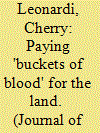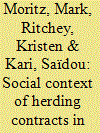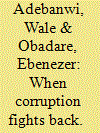|
|
|
Sort Order |
|
|
|
Items / Page
|
|
|
|
|
|
|
| Srl | Item |
| 1 |
ID:
108269


|
|
|
|
|
| Publication |
2011.
|
| Summary/Abstract |
Angola's oil-fuelled reconstruction since the end of the civil war in 2002 is a world away from the mainstream liberal peacebuilding approach that Western donors have promoted and run since the end of cold war. The Angolan case is a pivotal example of what can be termed 'illiberal peacebuilding', a process of post-war reconstruction managed by local elites in defiance of liberal peace precepts on civil liberties, the rule of law, the expansion of economic freedoms and poverty alleviation, with a view to constructing a hegemonic order and an elite stranglehold over the political economy. Making sense of the Angolan case is a starting point for a broader comparative look at other cases of illiberal peacebuilding such as Rwanda, Lebanon and Sri Lanka.
|
|
|
|
|
|
|
|
|
|
|
|
|
|
|
|
| 2 |
ID:
108266


|
|
|
|
|
| Publication |
2011.
|
| Summary/Abstract |
This paper challenges the prevailing focus on ethnic division and conflict in Southern Sudan in recent years, demonstrating that even within ethnically divisive debates over land, there are shared, transethnic levels of moral concern. These concerns centre on the commodification and monetisation of rural and kinship resources, including human life itself, epitomised in ideas of land being bought with blood, or blood being turned into money by the recent wartime economy. It argues that the enduring popular ambivalence towards money derives not only from its commonly observed individualising properties, but also from the historical association of money with government. Southern Sudanese perceive historical continuity in government consumption and corruption, and express concern at the expansion of its alternative value system into rural economies during and since the war. Whilst seeking to access money and government, they nevertheless continue to employ a discursive but powerful dichotomy between the moral worlds of state and kinship.
|
|
|
|
|
|
|
|
|
|
|
|
|
|
|
|
| 3 |
ID:
108270


|
|
|
|
|
| Publication |
2011.
|
| Summary/Abstract |
This paper analyses the local, presidential and legislative elections that took place in Burundi between May and September 2010. Electoral results are presented, analysed and interpreted against the background of Burundi's constitutional consociational power-sharing regime. The power-sharing arrangement, which was negotiated during Burundi's recently completed peace process, saved the pluralistic nature of the elections but may itself fall victim to the outcome of these same elections, with the dominant party CNDD-FDD obtaining an overwhelming majority in parliament and controlling most of the instruments needed to further establish its hegemony. Political pluralism, both within and outside the institutions, is under threat. As evidenced by developments in the early aftermath of the electoral marathon, conjunctural alliances between opposition groups and the incumbent regime's increasingly authoritarian response to dissidence may well result in renewed instability and insecurity.
|
|
|
|
|
|
|
|
|
|
|
|
|
|
|
|
| 4 |
ID:
108268


|
|
|
|
|
| Publication |
2011.
|
| Summary/Abstract |
Droughts across Africa have led to a shift in livestock ownership from impoverished pastoralists to absentee owners who contract hired herders to manage their animals. The assumption has been that these contracts are exploitative and negatively affect herd and rangeland management. We conducted an ethnographic study of a mobile pastoral system in the Far North Region of Cameroon to examine whether herding contracts provide sustainable livelihoods and allow herders to rebuild their herds. We found considerable variation in contracts and livelihoods, and argue that the social organisation of herding contracts may explain why they have no negative impact on herd and rangeland management.
|
|
|
|
|
|
|
|
|
|
|
|
|
|
|
|
| 5 |
ID:
108267


|
|
|
|
|
| Publication |
2011.
|
| Summary/Abstract |
The unfolding of the Third Wave of democracy cast a mounting weight on election observation in transition countries, partly due to the inability of regimes in power to conduct free and fair elections. However, observation is not always neutral. Sometimes observers distance themselves from the data they collect, leading to controversial certification of elections. In this case stakeholders may view them as partial, hence downsizing their credibility and trust. Yet observers' reports have rarely been reviewed. This article evaluates three reports by the leading election observer in Tanzania, the Tanzania Election Monitoring Committee (TEMCO) for the 1995, 2000 and 2005 general elections. It notes that despite the prevalence of the same factors that TEMCO considered as irregularities in the 1995 and 2000 general elections when it certified those elections as 'free but not fair', it issued a 'clean, free and fair' verdict on the 2005 general elections. This conclusion, at variance from the data, reveals problems in assuring observer neutrality.
|
|
|
|
|
|
|
|
|
|
|
|
|
|
|
|
| 6 |
ID:
108265


|
|
|
|
|
| Publication |
2011.
|
| Summary/Abstract |
This essay analyses the construction of the anti-corruption war under the civilian government in Nigeria between 1999 and 2008. We consolidate existing insights in the literature in three key ways. First, we show that in democratising contexts like Nigeria, the gravest threats to anti-corruption campaigns often emanate from a combination of intra-elite rancour and political intrigue. Second, we provide an explanation of what happens when, literally, corruption fights back. Finally, we suggest that where anti-corruption efforts are not backed by other radical institutional reforms, they fall prey to the overall endemic (systemic) crisis, a part of which, ab initio, necessitated the anti-corruption war.
|
|
|
|
|
|
|
|
|
|
|
|
|
|
|
|
|
|
|
|
|